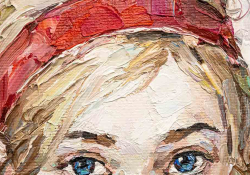Es and Is

A writer faces a surprising request: to write a negative review.
Dear Fada,
I know you’re busy submitting Ouzegane’s latest book—it was a great coup to be able to represent the first African poet to win the Nobel Prize!—but I really need your help.
Esadora wrote a novel!
Two years ago, she took it into her head to sculpt and splashed my poor grandfather’s teak furniture with hot polycarbonate.
Then she appropriated the Bohemian crystal goblets, a legacy from my aunt Antigone, for an assemblage that she insisted on calling a work of art: Sharp Transparency. What a high-sounding title for a sketch of a human statue made out of glued fragments!
Just a few months ago, she released three million crickets into the city to make the night “musical.” You know I’m responsible for every action she takes, both morally and legally, and I’m still paying (in installments) the fine for that disturbance of the peace.
I was interested in reading this novel—a modest and childish work—but as a mother would do with the work of a young daughter, I was also ready to be benevolent toward her efforts.
Esadora is just twenty years old and has no experience of the world; she is innocent, naïve.
This naïve girl asked me to review her novel and told me straight up to write a negative piece.
Well, this naïve girl asked me to review her novel and told me straight up to write a negative piece. You must speak badly of it, she said. You have to say it’s obscene garbage. Be shocked. Rip it apart. Demand that it be withdrawn from the bookstores. Sue me for libel.
What should I do?
Isadora
P.S. Don’t you find Ouzegane’s poems boring and anachronistic?
* * *
Good morning, Isadora.
I, your agent, am here to clear up any doubts and get you out of trouble, as always.
I read Esadora’s novel and am thrilled with it. I offered it to Xanadu Publishing. They also loved it. I’m about to finalize the contract.
You know what’s anachronistic? Your prose.
While you resort to an exhausting turn of phrase to describe the simplest situation, we readers have already gone for a walk, had our coffee, and taken out the trash, and when we return, you’re still there deciding whether or not to let your protagonist enter the restaurant. Esadora, however, isn’t afraid to get straight to the point. Two short sentences and we’re in.
If she has to talk about shit, periods, or sex, she talks about it. Uses those exact words. You seek out the metaphor, the poetic image, the allusion. Or you simply skim over it. Overlooking things has become your modus operandi. You gloss over your life and your writing. The engaging and compelling writer of the early days has vanished. Now, every time I read one of your books, I yawn and fast-forward through the pages. I have to try to convince publishers that you’ve matured, that you’ve become thoughtful and profound.
Readers want flesh and blood.
Fada
* * *
Fada, are you serious?
The new lenses almost fell out of my eyes! I’ve always wanted to be in their catalog. My favorite female writers have all been published by Xanadu. I left my old agent because that blazing idiot didn’t think it was a suitable publishing house for me.
And now you write me that you’ve gotten Xanadu to accept the first work of a beginner, and I stress the word “beginner.”
A Sharp Transparency, no doubt about it. I’m bleeding.
A novel in which the protagonist is a nymphomaniac who spends her time when she’s not having sex fantasizing about possible sex with complete strangers.
Never for a moment did I think that Esadora could put into practice what she writes about.
She invented a family, a father, mother, and even brothers and sisters. Who, nowadays, has such a traditional family? Who can afford to support so many kids?
In this work, there is such sympathy and solidarity between character and writer that I fear for her. People will end up believing that the erotic fantasies are true, that Esadora is hungry for sex.
In the past, the idea of telling an erotic and emotional story of sentimental education made my fingers itch on the keyboard. But I always resisted.
I created Esadora so I could have a reliable assistant who’d reserve flights and hotels for me during my book tours. Someone who would bring me tea and sign copies when my wrists ached after the hundredth signature.
If she’s my clone, she should have my brain and write like me.
How do I crush myself? It’s equivalent to admitting that I’m incompetent.
Isadora
* * *
Dear Isadora, you adorable ingenue.
Esadora may have had twenty years of a physical life, but she was cloned from your forty-year-old cells. Every one of our cells preserve the memory of our being. Thought isn’t an abstraction, not a ghost in the corporeal machine, but something that has form and substance.
Consider this.
Esadora has your experiences embodied in her, but also the freshness of a young mind, without blinders. She’s not afraid to descend into the mud of the psyche and play in it, as a child would with its own poop.
What is art if not an artist’s excrement? Well presented, it’s laid out on a canvas, aligned in quavers along a staff, or sculpted into evocative shapes.
For Esadora, a woman’s first love must be herself. If we don’t love ourselves, no one else will. The first step in loving yourself is to accept what you are, your imperfect body, your imperfect literary style, perhaps even the stupid ambition of being accepted by a certain publishing house, considering it the goal of a lifetime, and ignoring the prizes won with your best works.
At this point, I’ll add that you must also accept your second—cloned—body. You wanted it, and now you have to deal with it.
We discovered that God doesn’t exist, that the Grail doesn’t interest us, that Treasure Island is a scam. What’s left? Happiness.
Esadora is going out in search of happiness; she is an explorer, entering the jungle of femininity and ironically noting down every discovery. Listen to her thoughts, even when they talk to her about sex, enjoyment, physical pleasure. Unlike you, she’s not afraid of that. You, the original body, have become a literary coward. You censor yourself. You’ve put a lid on the pot of your desires. You’ve lowered the heat so that, while your passions simmer, you hope to devote yourself to higher works, to novels that will launch you into the kingdom of Xanadu. That’s not ambition but obsession.
Trust me, write a negative review, and give it a suggestive title that will immediately make the situation clear. A classic one might be “Dr. Jekyll and Miss Hyde.” Cut, tear, rip to shreds, and then scream in victory with your mouth covered in blood. I’ll clean you off with the money made from the sale of the novel. Remember that, legally, all of your clone’s earnings belong to you.
That said, I’d love for the next novel to be written by you and Esadora. I’ll be the agent for both of you. My percentage will be double, of course.
Translation from the Italian











